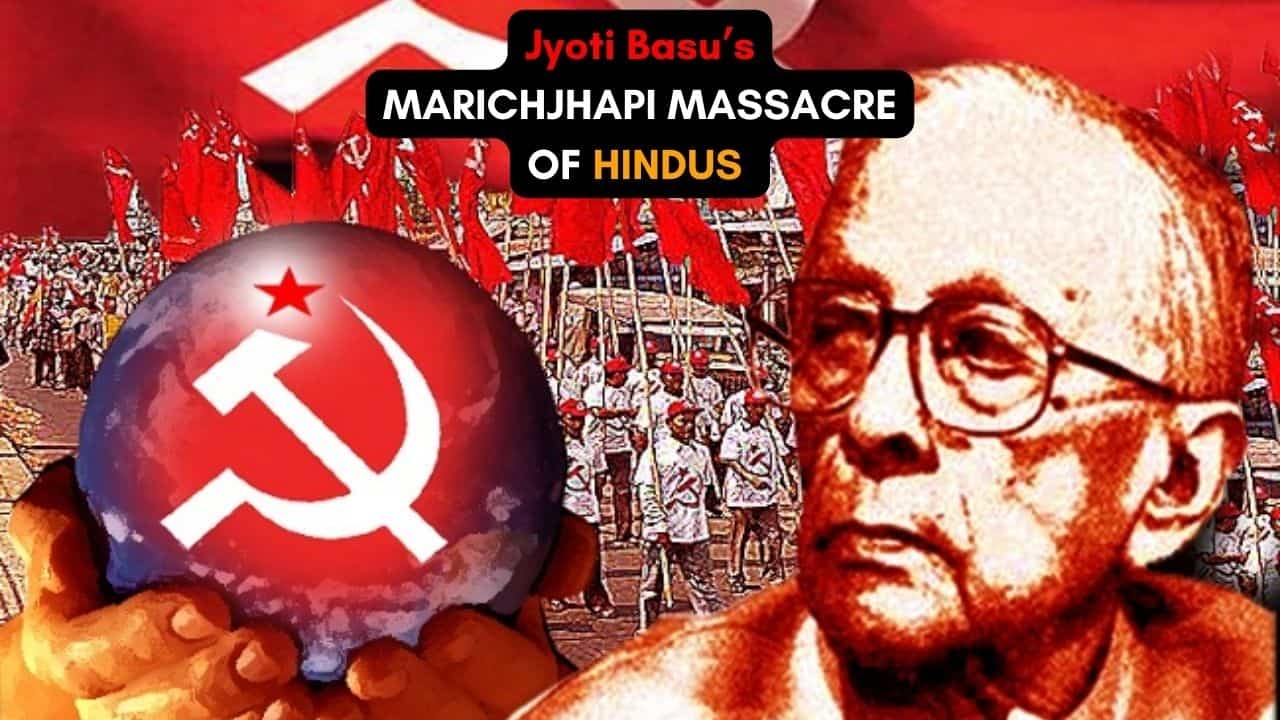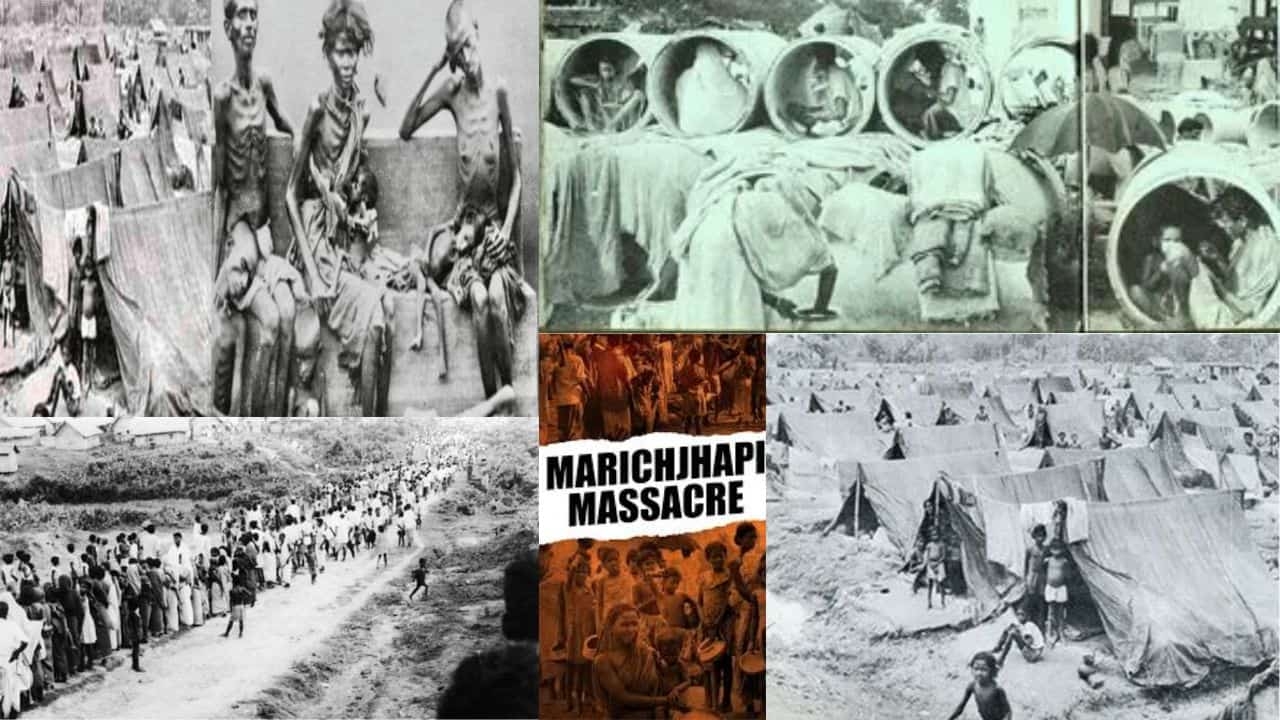The Marichjhapi Massacre: A Dark Chapter in West Bengal's History
The survivors of Marichjhapi, however, continued to be neglected. No one helped them overcome their trauma; they were abandoned or died in poverty and hopelessness. The absence of justice and acknowledgment compounded their harassment, perpetuating a history of suffering and injustice.
Total Views |

The Marichjhapi Massacre is a chilling reminder of the crimes perpetrated by Jyoti Basu when he was Chief Minister and his CPI-M government in West Bengal. Marichjhapi was the site of a gruesome clearance operation and mass murder in 1979, where thousands of Bengali refugees—reportedly numbering over thirty thousand—had settled on a remote strip of island within the Sundarbans. This is an article published that gives lurid details of how Jyoti Basu and his CPI-M goons massacred Bengalis.
The Context: Refugees in West Bengal
The massacre at Marichjhapi has its genesis in the 1947 partition of India, after which a huge number of Hindu refugees left East Pakistan for West Bengal. These refugees were first settled in makeshift camps scattered across India, especially deep inside the forested terrain of Dandakaranya, which was inhospitable for such a huge influx.
During the 1970s, many of these refugees returned to West Bengal because they were disillusioned with the appalling living conditions in Dandakaranya. Then, the refugees wanted to settle in the Sundarbans, particularly at Marichjhapi, believing that they had a right over land and hoping that they could start their new lives there.
The Arrival at Marichjhapi
In early 1978, around 30,000 refugees arrived at Marichjhapi Island. They began to clear the mangroves, build homes, and cultivate the land. Their efforts were initially supported by local Bengali sympathisers who provided them with food and resources. However, this newfound hope was short-lived.
Jyoti Basu's Stance: A Policy of Brutality
The CPI-M veteran hardliner Jyoti Basu saw the refugee colony at Marichjhapi as a challenge to his government and state ecology. Basu's government announced a sanctuary at Marichjhapi and described the refugees as squatters. This pronouncement paved the way for a spate of public-private endeavours that would converge to unveil one of the most sordid episodes in Bengal's history.
The Siege of Marichjhapi
The West Bengal government blockaded Marichjhapi in January 1979. Troops guided by Basu sealed off the entire island, blocking it from all food, water, and medical supplies. The refugees, who barely made a living under the relentless sun of the Sundarbans, were now on the brink of starvation and agonising death.
It was a lockdown on all fronts. With police patrols blocking help from anyone who tried, boats that tried to deliver aid were turned away or their supplies seized. Even though the refugees were asking for help, Jyoti Basu and his government had decided that the eviction must be done at any cost.
The Massacre
It ended in a tragic crisis in May 1979. Marichjhapi faced a massive attack by the police of West Bengal. The police, armed with rifles and batons, arrived on the island only to unleash a series of violent acts and terrors. They were beaten, shot, and drowned as they tried to flee.
Eyewitnesses describe the unimaginable hell of torture. And those rivers were full of floating bodies, and the cries of the wounded and the perishing resounded in the air. The death toll is unknown, but it has been estimated to be hundreds, if not thousands, of men, women, and children slain in open daylight during the massacre. Those who survived were then expelled by force and returned to the same gross camps from which they had originally escaped.

Jyoti Basu's Legacy: A Blot on West Bengal's History
But the massacre of Marichjhapi remains a chilling testimonial to their brutal authoritarianism under Comrade Jyoti Basu's stewardship as Chief Minister of West Bengal. His dark shadow cannot go away from his part in this disgusting Holocaust.
“The Marichjhapi massacre also exposes a leader who put his politics before the rights and plight of humanity. That tragic desert event is a direct result of his government refusing to recognise the plight of refugees, choosing instead to shift responsibility abroad, and enforcing policies that run contrary to justice and humanity.”
The Aftermath and Lack of Accountability
The CPI-M government, for its part, maintained a resolute silence on the issue in the years following this bloodbath. There were no official admissions of the murders, calls for investigations, or prosecutions against anyone. Jyoti Basu, with his party behind him, managed to silence anyone who dared question the actions and consequently ensured that tales of agonised Marichjhapi were never seen light of day.
The survivors of Marichjhapi, however, continued to be neglected. No one helped them overcome their trauma; they were abandoned or died in poverty and hopelessness. The absence of justice and acknowledgment compounded their harassment, perpetuating a history of suffering and injustice.
Conclusion
The Marichjhapi Massacre is a glaring illustration of the cruelty and ruthlessness with which Jyoti Basu perceived governance under his regime. It reveals just how little Basu cared for the blood that he had on his hands and went to any extent, which was nothing but absolute ruthlessness. For West Bengal, the massacre was nothing short of a black dot on its history, which reminds us constantly about how politics cost human lives!
While we reflect on Marichjhapi, it is important to ensure that the victims are not forgotten, and those in power who were responsible must be held accountable. The ordeal of Marichjhapi should not be allowed to fade. It is no less our responsibility than theirs to never let such a horror come about again because Jyoti Basu's name will always be sullied with Marichjhapi blood.
Article by
Shomen Chandra
Sub Editor, The Narrative


